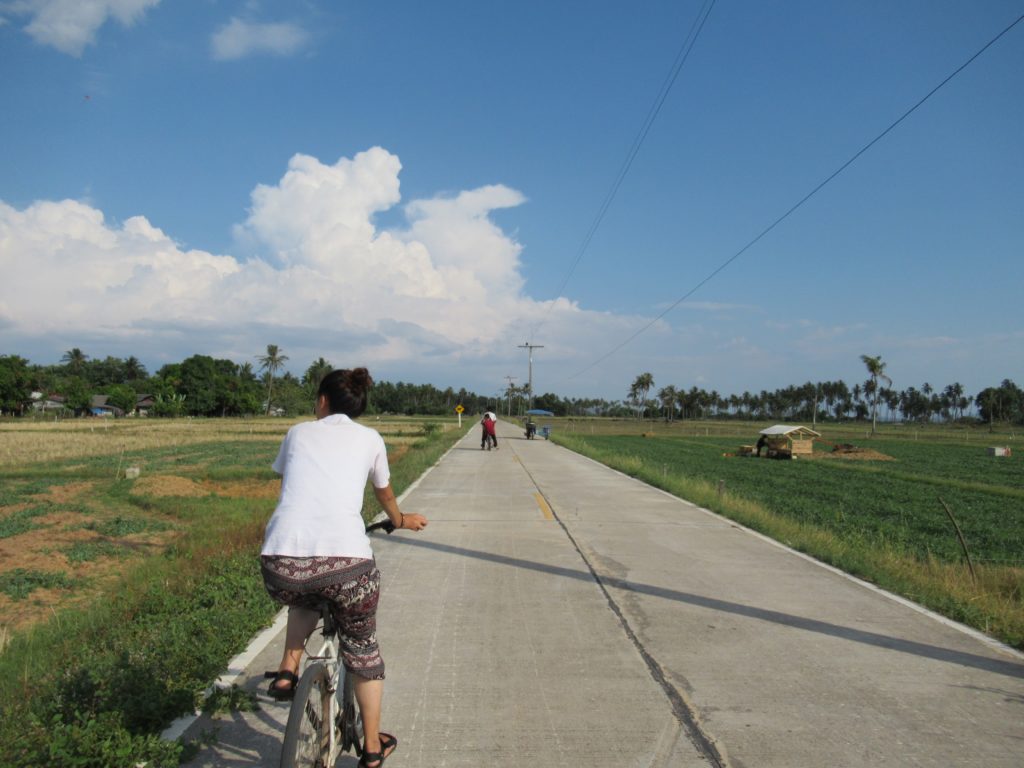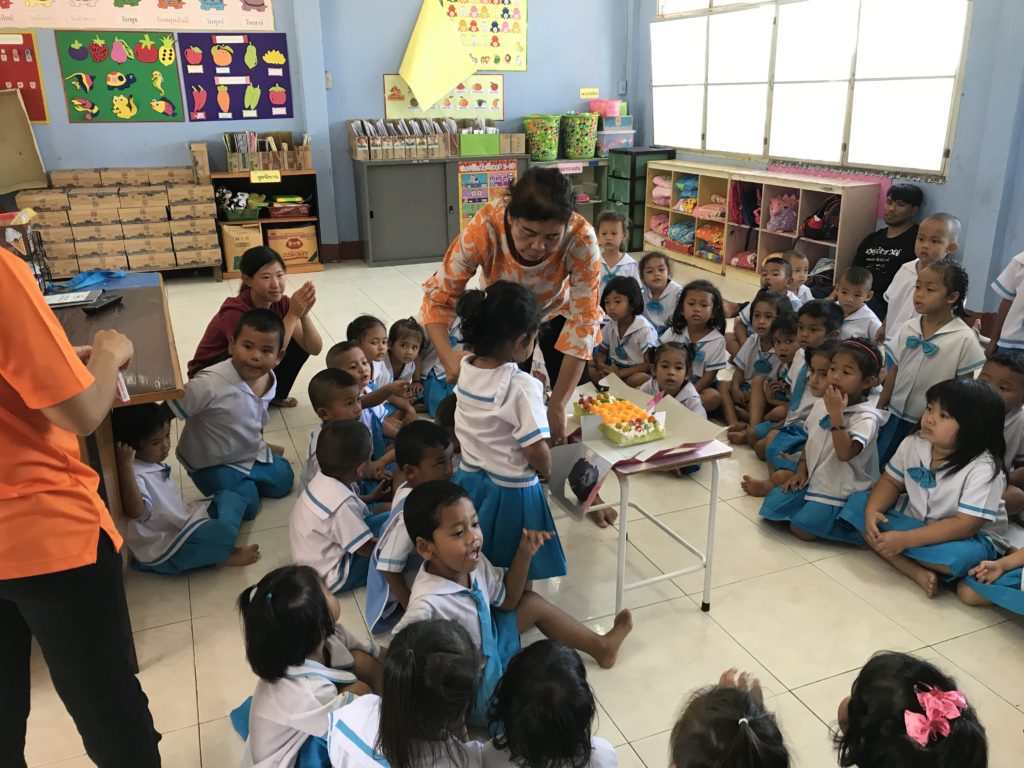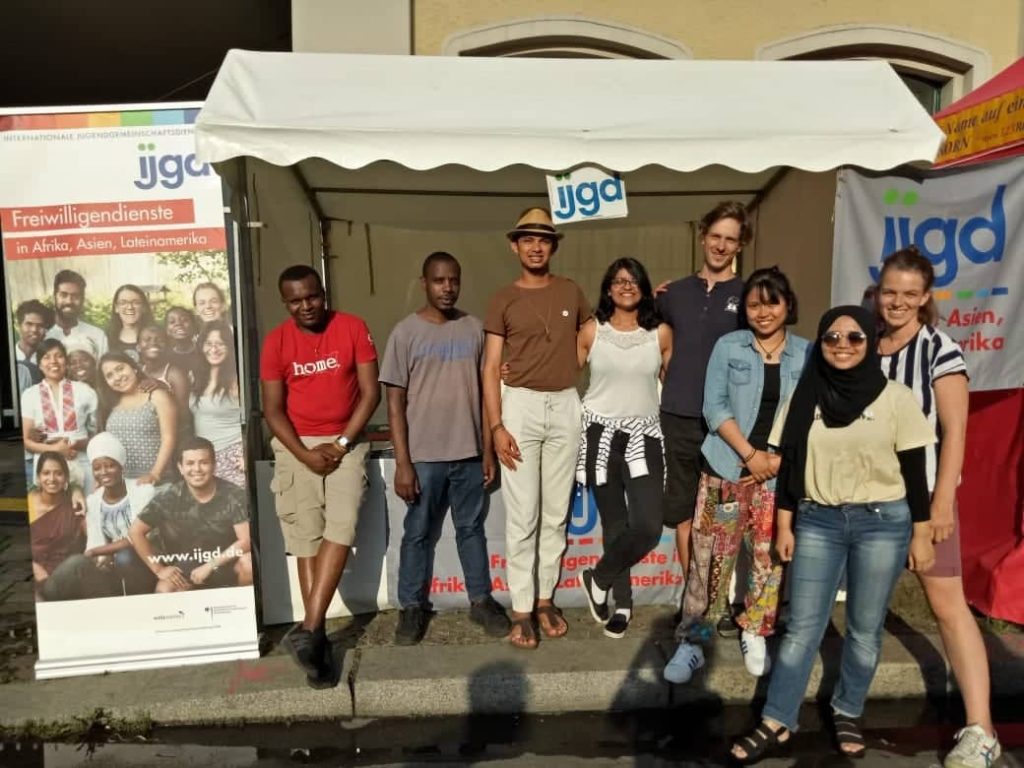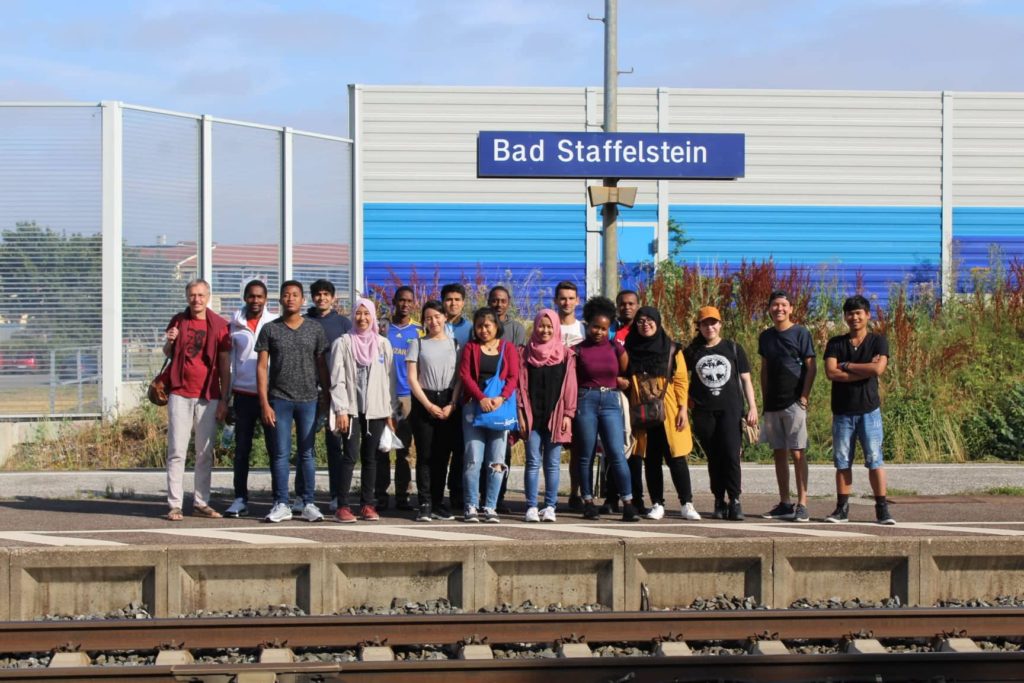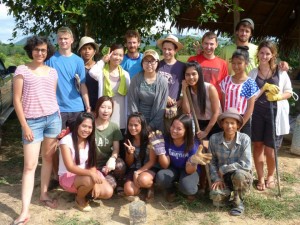ชื่อโครงการ เกษตรอย่างยั่งยืน
(ทำสวน ปลูกพัก และ แลกเปลี่ยนเรียนรู้วัฒนธรรม อาหาร นานาชาติ)
ค่ายบ้านโคกเหรียง อำเภอคลองหอยโข่ง จังหวัดสงขลา
ระยะเวลาโครงการ ตลอดทั้งปี
ประวัติโครงการ
ดาหลาเริ่มกิจกรรมกับบ้านโคกเหรียงตั้งแต่เดือนภุมภาพันธ์ 2556 เปิดเป็นโครงการระยะยาวต่อเนื่อง รับอาสาสมัครตลอดทั้งปี โดยมีกิจกรรมหลักคือ ทำเกษตร มีเจ้าของโครงการชื่อลุงแจงที่อยากทำเกษตรแบบปลูกเพื่อกิน ลุงแจงมีความคิดเกี่ยวกับการกินอาหารที่ปลอดภัย จะทำให้สุขภาพดี เพราะลุงแจงมีโรคประจำตัว(โรคหัวใจ) เลยต้องดูแลเรื่องการกินเป็นพิเศษ
ดาหลารู้จักลุงแจงได้อย่างไร เมื่อปี 2549 ดาหลาได้ร่วมงานกับชมรมคนแบกเป้มหาวิทยาลัยหาดใหญ่ เพ่อดำเนินกิจกรรมด้านการอนุรักษ์ป่าต้นน้ำ จากนั้นดาหลา ชมรมคนแบกเป้และลุงแจงก็ได้ร่วมกิจกรรมด้วยกันมาอย่างต่อเนื่อง จนกระทั้งเมื่อปี 2556 ลุงแจงได้ลาออกจากงานประจำ เพื่อมาทำสวน ลุงแจงและเพื่อนมีความคิดอยากปลูกผักกินกเอง ปลูกแบบผสมผสานทุกอย่างในพื้นที่สวน 8 ไร่ ซึ่งในอนาคต ลุงแจงคาดหวังอยากให้พื้นที่บ้านลุงแจงเป็นพื้นที่ให้ชาวบ้าน รวมถึงคนจากชุมชนข้างนอกสามารถเข้ามาร่วมเรียนรู้ด้วยกันได้ ดาหลาจึงสนับสนุนความคิดของลุงแจง ด้วยการเสนอให้มีอาสาสมัครนานาชาติในพื้นที่ ไว้เป็นพื้นที่แห่งการเรียนรู้ร่วมกันในเรื่องการเกษตรต่อไป เมื่อโครงการได้เริ่มขึ้น ดาหลาได้ส่งอาสาสมัครระยะยาวอย่างต่อเนื่อง และได้จัดกิจกรรมค่าระยะสั้นเป็นเวลา 2 สัปดาห์บ้างในบางเดือน เพื่อเปิดพื้นที่ให้คนที่อยากทำทำสวน และแลกเปลี่ยนเรียนรู้การเกษตร บางเวลาก็มีกลุ่มเยาวชนจากพื้นที่ต่างๆมาร่วมกิจกรรมด้วย เช่น กลุ่มยิ้มจากยะลา กลุ่มเยาวชนโรงเรียนคลองโต๊ะเหล็ม จังหวัดสตูล เป็นต้น
กิจกรรมที่จะทำ
– ทำเกษตรเช่น ปลูกผัก เลี้ยงปลา รดน้ำพืชผัก ผลไม้ ในสวน เวลาทำงานแบ่งเป็น 2 ช่วง ช่วงเช้าเวลาประมาณ 7-10 โมง และช่วงเย็น16.00-18.00 น.
– แลกเปลี่ยนเรียนรู้กิจกรรม วัฒนธรรม อาหาร กับเพื่อนอาสาสมัครนานาชาติ
บริบทชุมชน
บ้านโคกเหรียงตั้งอยู่ที่ ตำบลโคกม่วง อำเภอคลองหอยโข่ง จังหวัดสงขลา อยู่ห่างจากสนามบินหาดใหญ่ประมาณ 5 กิโลเมตร ชาวบ้านนับถือศาสนาพุทธ ชาวบ้านส่วนใหญ่ทำสวนยางพารา แต่ก็มีบางส่วนที่เดินทางออกมาทำงานในตัวเมืองหาดใหญ่ เนื่องจากบ้านโคกเหรียงเป็นชุมชนใกล้เมือง ชาวบ้านส่วนใหญ่ไม่ค่อยได้ให้ความสนใจในเรื่องการเพาะปลุกผักกินเอง ทั้งๆที่พื้นที่เหมาะแก่การเพาะปลูก เน้นการซื้อจากท้องตลาดเป็นหลัก เช่นเดียวกันท้องทุ่งนาก็ได้ปล่อยว่างไม่มีการทำนา มีเพียงบางครอบครัวเท่านั้นที่ยังคงทำอยู่ มีร้านค้าชุมชนเป็นจำนวนมาก ไม่มีตู้ ATM กดเงินสด
อาหาร
รับประทานอาหารทุกประเภท แต่ลุงแจงเจ้าของโครงการจะทำอาหารเพื่อสุขภาพเป็นหลัก เพราะลุงแจงจะให้ความสำคัญเรื่องกินมากที่สุด การทำอาหารลุงแจงจะเป็นคนทำเป็นหลัก อาสาสมัครจะต้องช่วยลุงแจงในการเตรียมอาหารและบางครั้งจะต้องทำอาหารเองบ้าง มีครัวสำหรับที่ทำอาหารเพียบพร้อม อาหารที่บ้านลุงแจง ไม่มีการใส่ผงชูรส รสดี หรือส่วนผสมที่ไม่ดีต่อสุขภาพ และลุงแจงเน้นเรื่องความสะอาดและความเป็นระเบียบของของบ้าน
ที่พัก
อาสาสมัครพักที่บ้านของลุงแจง ตอนนี้มีห้องพักสำหรับอาสาสมัคร 3 ห้อง ห้องละ 2 คน แยกนอนชายหญิง เว้นแต่กรณีที่แต่งงานแล้วสามารถอยู่ด้วยกันได้ หรือถ้ามีค่ายระยะสั้นเกิดขึ้น จำนวนอาสาสมัครหลายคน ก็จะนอนในบริเวณพื้นของบ้าน มีมุ้ง และเต้นท์ ไว้สำรอง พื้นบ้านเป็นโล่งโถ่ง อากาศถ่ายเทได้สะดวก
ซักผ้า
ซักผ้ากับเครื่อง แต่ห้ามซักชุดชั้นใน กางกางใน ผงซักฟอก น้ำยาปรับผ้านุ่ม เตรียมมาเอง
ห้องน้ำ
มีห้องน้ำสำหรับอาสาสมัคร 2 ห้อง สามารถใช้ส้วมและอาบน้ำในห้องเดียวกัน
คุณสมบัติของอาสาที่จะเข้าร่วม
– ชอบทำเกษตร และชีวิตแบบเรียบง่าย ทำงานในที่ที่มีอากาศร้อนได้
– ใจกว้าง พร้อมเรียนรู้สิ่งใหม่ ๆ และสามารถอยู่ร่วมกับคนอื่นได้
– มีความคิดสร้างสรรค์ และสนใจกิจกรรมต่างๆ
จำนวนอาสาสมัครระยะยาวที่เปิดรับสมัคร
– อาสานานาชาติ 5 คน
– อาสาสมัครไทย 2 -3 คน
การติดต่อสื่อสาร
สัญญาณโทรศัพท์ใช้ได้ทุกระบบ มีอินเตอร์เน็ต สามารถใช้ WIFI ได้ แต่ต้องไม่ใช้ในเวลาที่ทำงาน สามารถใช้อินเตอร์เน็ตได้เมื่อเป็นเวลาพักผ่อนเท่านั้น
การเดินทาง
– จากกรุงเทพ สามารถเดินทางโดยรถไฟ มาลงที่สถานีหาดใหญ่ หลังจากนั้นต่อรถสองแถวสีฟ้าหรือสีขาว ที่เขียนว่าสนามบิน หรือตลาดเกษตรแต่ต้องเดินออกมาจากสถานีรถไฟหาดใหญ่ มาขึ้นรถสองแถวที่หน้าตลาดกิมหยง (สามารถถามแม่ค้าระหว่างทางได้) ใช้เวลาในการเดินไปตลาดกิมหยงประมาณ 10 นาที และใช้เวลาในการนั้งรถสองแถวประมาณ 20 นาที ค่าโดยสารประมาณ 10 บาทตลอดสาย เมื่อถึงที่ศูนย์โตโยต้าหาดใหญ่ในให้เตรียมตัวกดกริ่งลงหน้าหมู่บ้านรติมา เดินเข้าซอยเพชรเกษม 43 (จุดสังเกต ป้ายสีเขียนเขียนว่า พอตารีสอร์ท) เดินเข้าซอยประมาณ 5 นาที สำนักงานดาหลาอยู่กลางซอย มีป้ายดาหลาติดอยู่ในบ้านสามารถเห็นได้ชัด บ้านเลขที่ 86
– รถบัส กรุงเทพ หาดใหญ่ หลังจากนั้นต่อรถสองแถวสีฟ้าหรือสีขาว ที่เขียนว่าสนามบินขนส่ง หรือตลาดเกษตรแต่ต้องเดินออกมาจากสถานี บขส.หาดใหญ่ มาขึ้นรถสองแถวที่หน้าเซเว่นอีเลเว่น (สามารถถามแม่ค้าทางได้) ใช้เวลาในการนั้งรถสองแถวประมาณ 35 นาที ค่าโดยสารประมาณ 10 บาทตลอดสาย เมื่อถึงที่ศูนย์โตโยต้าหาดใหญ่ในให้เตรียมตัวกดกริ่งลงหน้าหมู่บ้านรติมา เดินเข้าซอยเพชรเกษม 43 (จุดสังเกต ป้ายสีเขียนเขียนว่า พอตารีสอร์ท) เดินเข้าซอยประมาณ 5 นาที สำนักงานดาหลาอยู่กลางซอย มีป้ายดาหลาติดอยู่ในบ้านสามารถเห็นได้ชัด บ้านเลขที่ 86
– เครื่องบินจากกรุงเทพ ลงสนามบินหาดใหญ่ หลังจากนั้นต่อรถสองแถวสีฟ้า ที่เขียนว่าขนส่ง สนามบิน หรือตลาดเกษตรแต่ต้องเดินออกมาจากสนามบินหาดใหญ่ มาขึ้นรถสองแถวที่หน้าถนนทางออก (สามารถถามผ่านประชาสัมพันธ์ได้) ใช้เวลาในการนั้งรถสองแถวประมาณ 20 นาที ค่าโดยสารประมาณ 20 บาทตลอดสาย เมื่อถึงที่ราชาเฟอร์นิเจอร์ให้เตรียมตัวกดกริ่งเดินข้ามถนนมาอีกฝั่ง สังเกตชื่อหมู่บ้านรติมา เดินเข้าซอยเพชรเกษม 43 (จุดสังเกต ป้ายสีเขียนเขียนว่า พอตารีสอร์ท) เดินเข้าซอยประมาณ 5 นาที สำนักงานดาหลาอยู่กลางซอย มีป้ายดาหลาติดอยู่ในบ้านสามารถเห็นได้ชัด บ้านเลขที่ 86
เงื่อนไขการร่วมโครงการ
1.ต้องเสียค่าบำรุงสมาคมเดือนละ 3,500 บาทซึ่งจะนำมาเป็นค่าอาหารสำหรับผู้เข้าร่วม ค่าที่พัก ค่ากิจกรรมต่างๆ ของสมาคม
2.ต้องมีอายุ 18 ปีขึ้นไป และต้องแจ้งผู้ปกครองให้รับทราบก่อนเข้าร่วมโครงการ
3.ผู้เข้าร่วมเป็นผู้รับผิดชอบดูแลความปลอดภัยของตนเอง
4.ผู้เข้าร่วมต้องร่วมกิจกรรมอย่างน้อย 1 เดือน
5.ของส่วนตัวผู้เข้าร่วมต้องเตรียมเอง (ยาสระผม ผงซักฟอก แป้ง สบู่ )
สิ่งที่ต้องเตรียมมาร่วมค่าย
1.ถุงนอน หรือผ้าห่ม
2.เสื้อผ้าสำหรับสวมใส่ 2 สัปดาห์ (ผู้หญิงเสื้อแขนกุด กางเกงขาสั้นไม่อนุญาตใส่ระหว่างค่าย)
3.เสื้อผ้าสำหรับใส่ทำงาน สามารถสกปรกได้ และไม่เสียดายทีหลังค่ะ
4.อุปกรณ์กันแดด หมวก ครีมกันแดด
5.ถุงมือ และรองเท้าผ้าใบหรือรองเท้าหุ้มส้น สำหรับทำงาน
6.รูปถ่าย หรืออาหารท้องถิ่นของตนเอง (สำหรับมาแลกเปลี่ยนกับผู้ร่วมค่ายคนอื่น ๆ)
7.สเปรย์กันยุง (กรุณาเลือกอันที่เป็นมิตรกับสิงแวดล้อม)
8.ไฟฉาย (เลือกแบบที่สว่างมาก ๆ และควรเป็นแบบชาร์จแบตเตอรี่ )
9.ความคิดสร้างสรรค์ เกมส์ เพลง เพื่อความบันเทิงในค่าย
10.ความคิดด้านบวก มองโลกในแง่ดี และรอยยิ้มที่สดใส
11.เมล็ดพันธ์ผัก (ถ้ามี)
สิ่งที่ห้ามนำมาในค่าย
1.สารเสพติด
2.แอลกอฮอล์
3.อคติ หรือความคิดด้านลบ
สนใจสอบถามข้อมูลเพิ่มเติม ติดต่อ
สมาคมอาสาสมัครนานาชาติเพื่อการพัฒนาสังคม (ดาหลา)
86 เพชรเกษม 43 ต.หาดใหญ่ อ.หาดใหญ่ จ.สงขลา 90110
www.dalaa-thailand.com
Email: dalaa.thailand@gmail.com
Tel. 074 266 286

